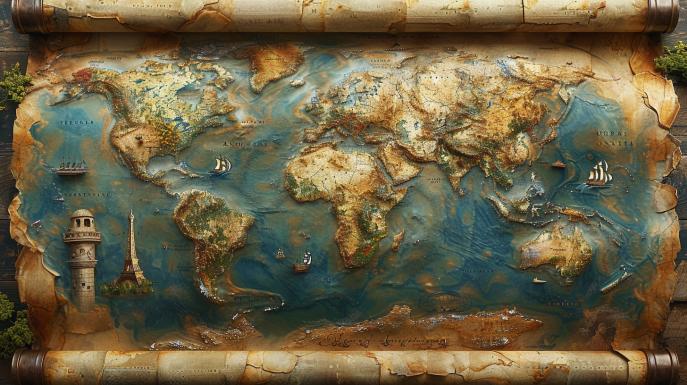Viaje conosco pela fascinante tapeçaria do passado em "Viagem pela História Mundial ensina hoje".
Descubra como, milênios depois, as primeiras leis e governos ainda esculpem os contornos da justiça moderna, como as grandes civilizações moldaram nosso entendimento de sociedade e poder e por que líderes do passado ainda ecoam em nossas vidas. Prepare-se: as aulas de história mais impactantes estão prestes a começar!
What teachings from ancient history still influence the modern world?
The first ancient laws and governments are the foundations of modern justice systems. Mesopotamia and Egypt established the foundations of governance that guide our current understanding of society and power. Great leaders and their philosophies continue to shape our contemporary culture. Those teachings of ancient history They are vital to the structure of our current existence, influencing everything from our legislation to our daily social interactions.
How are the impacts of world wars still felt in today's society?
The world wars triggered transformations that permeate diplomacy and contemporary international relations. The rise and fall of empires brought crucial lessons in leadership and military strategy. The pressing need to balance power prompted more refined diplomacy, sometimes forging unprecedented alliances. Brutal armed conflicts highlighted human fragility and resilience, driving the creation of institutions focused on human rights and the search for peaceful resolutions of international disputes.
What were the historical contributions to humanity that paved the way for contemporary innovation?
Advances like the Gutenberg press and the steam engine were crucial, transforming access to information and transportation. These inventions marked the industrial revolutions and had a significant impact on the evolution of society, aspects that outline the structure of our modernity. The exchange of physical goods, which gave way to currency, highlights the imperative of fair trade and the consequences of economic inequality. Many of the devices and conventions of the ancient world continue to be fundamental to the functioning of today's societies.
What lessons can we extract from past mistakes to build a more equitable and informed future?
Tragic events, such as slavery and genocide, highlight the urgency of fighting for human rights and the peaceful resolution of conflicts. Pandemics, seen throughout history, reinforce the importance of public health and international cooperation. Understanding governance and democratic systems from ancient democracies to contemporary republics is crucial to safeguarding democratic principles in the 21st century.
How are the impacts of world wars still felt in today's society?
What leadership lessons and military strategies have we learned from the rise and fall of empires? The leadership and military strategies of empires teach about the conduct of power and the importance of balance and diplomacy, factors that are still crucial in international relations today. The rise and fall of empires reveal how leadership affects the destiny of nations and signal the consequences of power imbalances and a lack of effective diplomacy. To the World Wars, with its traumatic armed conflicts, transformed the perception of human rights and the need for peaceful resolutions, resonating until modern times.
By exploring humanity's journey from the first civilizations, through global conflicts and revolutions to contemporary challenges, we have a rich tapestry of teachings. This post has highlighted how ancient government and philosophy echo in our justice system, how world wars reshape diplomacy and perceptions of humanity, and how ancient inventions and economic processes are precursors to current innovations. By understanding and reflecting on these legacies – including the mistakes of the past – we have a valuable map to provide guidance, avoiding repeat failures and illuminating the path to a more just and enlightened future. This knowledge is not just hindsight, but a vital compass in the conscious conduct of our modern lives.
FAQ
Teachings of Ancient History and Modern Implications
Q: What are the foundations of modern justice systems originating in antiquity?
A: The early laws and governments of Mesopotamia and Egypt are the foundations of modern justice systems, establishing foundations of governance that still guide our understanding of society and power.
Q: How have the world wars influenced current diplomacy and international relations?
A: The world wars triggered transformations in diplomacy and international relations that still persist, including lessons in leadership and military strategy, unprecedented alliances, and the establishment of institutions focused on human rights and peaceful resolutions.
Q: What historical innovations were fundamental to industrial revolutions and modern society?
A: The Gutenberg press and the steam engine were innovations that transformed access to information and transportation, marking the industrial revolutions and significantly impacting social evolution, with clear influences on the modern structuring of society.
Q: How can we use historical mistakes to build a better future?
A: We can learn from historical tragedies, such as slavery and genocide, and pandemics to fight for human rights and promote international cooperation, as well as understand democratic systems to protect democratic principles in the future.
Q: How do the rise and fall of empires contribute to today's leadership lessons?
A: The lessons of leadership and military strategies drawn from the rise and fall of empires teach about the importance of balance of power and effective diplomacy, which are crucial in the scenario of contemporary international relations and conflict management.

